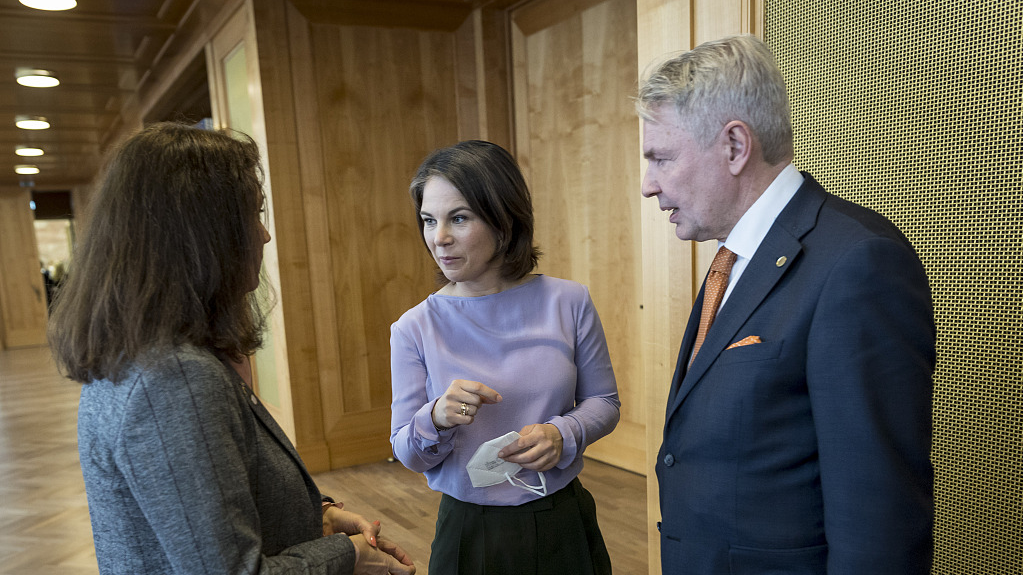
Foreign Minister of Sweden Ane Lind (L), German Foreign Minister Annalena Baerbock (M) and Foreign Minister of Finland Pekka Haavisto, chat during the informal meeting of NATO Ministers of foreign affairs in Berlin, Germany, May 14, 2022. /VCG
Foreign Minister of Sweden Ane Lind (L), German Foreign Minister Annalena Baerbock (M) and Foreign Minister of Finland Pekka Haavisto, chat during the informal meeting of NATO Ministers of foreign affairs in Berlin, Germany, May 14, 2022. /VCG
Editor's note: Christopher Helali is the international secretary of the Party of Communists USA and a PhD candidate in philosophy and China Government Scholar for Sino-U.S. Cultural Communication at Tongji University. The article reflects the author's opinions and not necessarily the views of CGTN.
This past week, Finnish President Sauli Niinisto and Prime Minister Sanna Marin, indicated that Finland was ready to "apply for the North Atlantic Treaty Organization (NATO) membership without delay." This was a historic departure from the traditional foreign policy of Finland which, following World War II, sought to maintain good relations both with the West and Russia.
Following the announcement from the political leadership in Finland, Swedish government officials indicated that this was an important announcement that will pave the way for Sweden to also join the NATO alliance.
Like Finland, Sweden also sought to maintain diplomatic relations with both the West and Russia, choosing a neutral foreign policy. At times, Sweden's foreign policy was even progressive under the late Prime Minster Olof Palme.
Recent media reports portray a nervous and restless population in both countries. Recent polling in Finland shows over 70 percent of respondents were now in favor of joining the NATO alliance, up from approximately 20-30 percent in prior years. Public opinion has been impacted by the ongoing Russian "special military operation" in Ukraine.
Finland and Sweden's overtures to join the NATO alliance have been criticized by Russia. The Russian Foreign Ministry described Finland's desire to join NATO as a radical change in Finnish foreign policy. Russia reserved the right to take "retaliatory steps, both of a military-technical and other nature in order to counter the emerging threats to its national security."

The Finnish-Russian Imatra border crossing in Imatra, south-eastern Finland, May 13, 2022. /VCG
The Finnish-Russian Imatra border crossing in Imatra, south-eastern Finland, May 13, 2022. /VCG
Press Secretary for Russian President Vladimir Putin, Dmitry Peskov, stated that "NATO expansion does not make the world more stable and secure." Indeed, NATO's expansion has been viewed as an existential threat by the Russian Federation.
The timing of Finland and Sweden's push to join NATO come as the military operations in Ukraine are ongoing with no peace agreement in sight. Many Finns and Swedes are pressuring their governments to expedite the process of joining NATO. Motivated by fear and distrust, they see their once peaceful neighbor as an unpredictable aggressor.
Yet, this particular moment to join NATO comes at a critical and dangerous time. This latest NATO expansion will only be seen as an escalation of an already existential national security threat for Russia. This security threat can be understood by looking at the map of Eastern Europe and plotting NATO's expansion.
Currently, Russia shares approximately 1,215 km of a land border with five NATO states including Norway, Latvia, Lithuania, Estonia, and Poland. The addition of Finland which shares a 1,340 km border with Russia would more than double Russia's land border with NATO.
This new NATO expansion further encircles Russia, posing geostrategic and military issues to Russia regarding its strategic depth. While Finland and Sweden are now openly embracing NATO, it was not always this way.
Finland was part of the Russian Empire for over a century. It was in the Finnish city of Tampere that Vladimir Lenin first met Josef Stalin in 1905. The city now has a charming Lenin Museum which I had the honor of visiting in 2018.
Following the Bolshevik Revolution, Finland declared its independence which was recognized by Lenin and the Russian Soviet Federative Socialist Republic. Immediately, Finland plunged into a brutal civil war which the socialists eventually lost.
Finland and the Soviet Union would fight two wars from 1939-1944 when Finland eventually ceded territory including most notably parts of Karelia. During the Cold War, Finland tried to maintain good relations both with the Soviet Union and with the West. Finland and the Soviets ran joint industrial ventures and coordinated economic materials and development.
Sweden likewise maintained political neutrality with both the West and the Soviet Union during the Cold War. Like Finland, Sweden also had a past history with the Russian Empire. Starting in the 1600s, Russia and Sweden would be at war at various points during those four centuries. Sweden, like Finland, maintained and continues to maintain a robust military force.
The accession of Finland and Sweden to NATO will fundamentally change the architecture of European security, further damaging the global geopolitical landscape. The expansion of NATO along the Russian border poses an enormous security challenge for the Russian Federation which very well could lead to a new arms race and buildup of military technology along the border.
Not every other member of the NATO alliance was supportive of Finland and Sweden joining. Turkey voiced its concern and opposition to Sweden and Finland joining the NATO alliance citing their countries being host to active members of the Kurdistan Worker's Party (PKK), a terrorist organization in countries including Turkey, the EU, the U.S., and the UK.
While politicians and citizens in Finland and Sweden plan the next steps to formally join NATO, Russia continues diplomatic means to ensure NATO expansion doesn't occur. Talk about peace is NATO doublespeak. NATO expansion imperils Europe and the world now more than ever before.
(If you want to contribute and have specific expertise, please contact us at opinions@cgtn.com. Follow @thouse_opinions on Twitter to discover the latest commentaries on CGTN Opinion Section.)

